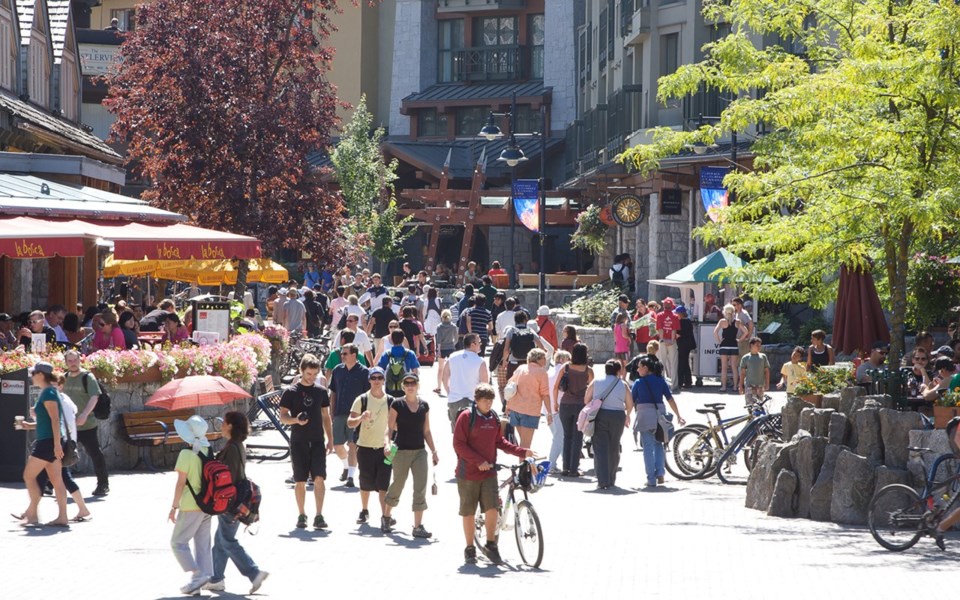The Resort Municipality of Whistler (RMOW) is moving quickly on bylaws to assist local businesses during their careful reopening in the wake of the first wave of COVID-19—while also looking at moves to protect the long-term vibrancy of Whistler Village.
As of May 19, restaurants and patios across B.C. are now permitted to resume in-person dining under strict requirements of the Provincial Health Officer, including operating at a maximum 50-per-cent capacity and groups of up to six people per table, with each group seated at least two metres apart.
Since then, the RMOW has been working with stakeholders including the Restaurant Association of Whistler (RAW) and individual operators to guide the local reopening plan.
At its June 9 meeting, council gave all three readings and adopted a set of bylaws to allow for temporary outdoor patios in Whistler Village, along with several supporting resolutions.
Looking further ahead, other resolutions introduced on June 9—stemming from a consultant's report commissioned more than a decade ago—seek to lock down key food and beverage locales in the resort.
That report by Thomas Consultants, completed in 2010, recommended using spot zoning to protect 40 restaurant locations deemed to be important to vibrancy in the village.
Since then, five of the identified locations have been fully or partially converted while two others sit vacant.
New proposed zoning and land use contract amendment bylaws—which council authorized staff to begin preparing at the June 9 meeting—would prohibit the remaining key food and beverage locations from changing uses.
"Closures and conversions of space and capacity being led to other uses would definitely have a negative impact on the visitor experience and our overall tourism economy into the future," said general manager of resort experience Toni Metcalf, in a pre-council media briefing, adding that the RMOW appreciates it is a big move, and that not all stakeholders will agree, "but they certainly have shared that they understand why we would do this."
The resolution also directs staff to report any building permit applications that conflict with the bylaws under preparation (under the Local Government Act, a municipality can withhold the issuance of a building permit if it's in conflict with a bylaw being prepared, said planner Melissa Laidlaw, in the briefing).
Staff will consult with resort stakeholders and hold an online public information meeting before bringing forward the bylaws, which would also be subject to a public hearing process.
As for the temporary patio bylaws, it's the second time the RMOW has used emergency powers under provincial Order M139, which allows municipalities to introduce and pass a bylaw in one sitting.
With their adoption, businesses will soon be able to apply for a temporary patio using a single form (and with a $240 fee) that covers all the relevant legalities.
Temporary patios will be permitted until October 31.
For businesses without space for temporary patios, the RMOW plans to increase the number of public picnic tables in select locations throughout the village, and is also considering "patio areas" on select municipal roads in the village core area (Main Street is one location being considered, though merchants in the area have stressed the importance of the street parking out front—the initiative is a work in progress).
There was discussion of subsidizing the application fee, Laidlaw said, but the RMOW ultimately decided against waiving fees for just one sector.
"We wanted to maintain a consistent approach," she said.
The money will be used to cover staff time associated with processing applications, which in this case will prove tricky.
"Whistler doesn't have a typical grid, or street pattern, where everything is uniform," Laidlaw said. "The Village Stroll meanders and turns and is wider in some areas and narrow in other areas, so each of these things does warrant a careful look ... hence the fee."
And as for what temporary patios look like on the ground, municipal staff have already been out walking around envisioning it themselves, said director of planning Mike Kirkegaard.
"We've been doing some ground work already in our minds, getting out there, and part of that is consideration of access to adjacent retail stores and things like that," Kirkegaard said, adding that the RMOW is nearing completion of a mapping project of the entire village area as well.
"And that mapping will lay out all of those different constraints that we might have around fire-lane access, minimum widths, where we have existing garbage receptacles and bike racks and those kinds of things."
The streamlined application process will ask businesses for a two-scale drawing of their proposal, proper approvals from stratas, a description of furnishings and whether there is liquor licensing or not, Kirkegaard said.
Staff will then review the applications with an expected turnaround time of seven to 10 days.
A further recommendation from RAW to temporarily allow for liquor consumption in designated public spaces is not supported by the RMOW at this time, though staff is committed to investigating it further.
While there is more work to do, RAW is enthusiastic about what's been done so far, said chair Eric Griffith in an email.
"We are 100-per-cent confident this work is being done to the highest standards," Griffith said. "RAW is very pleased how our community is pulling together to do whatever possible to succeed during our re-opening phases in Whistler and to make a vibrant resort experience for our summer guests."
Prior to COVID-19, Whistler's food and beverage sector employed an estimated 18 per cent of the resort's workforce and contributed 14 per cent (or $250 million) to the $1.79 billion gross domestic product generated from Whistler, according to a staff report to council.
As a commercial property owner who leases to food and beverage businesses, Councillor John Grills recused himself from the discussion and subsequent voting.
Businesses can find more resources at whistler.ca/saferestart.




